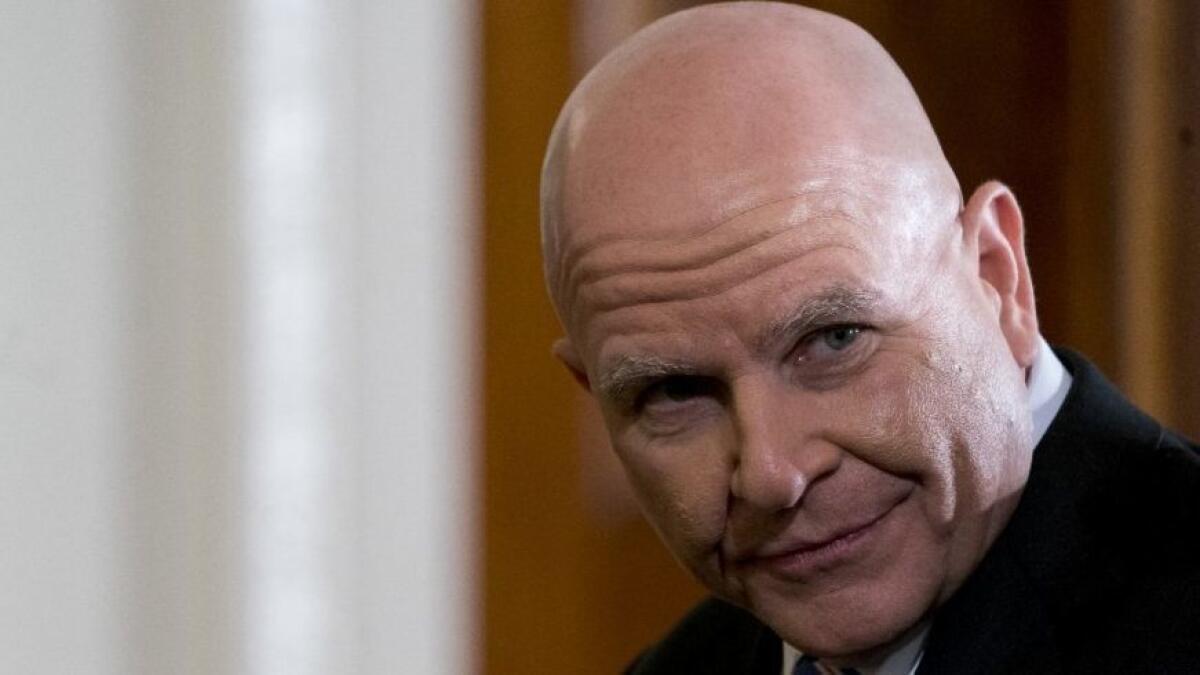Column: H.R. McMaster’s parting shot at his dictator-loving boss

- Share via
On Tuesday, H.R. McMaster — the still-uniformed Army lieutenant general who won medals for valor in Iraq, Afghanistan and the Persian Gulf — peaced out on his role as national security advisor to President Trump.
For about a year, the president had humiliated McMaster as if he were a cowering pharma rep on “The Apprentice.” Finally, on March 22, he essentially fired the Army officer in a sucker-punch tweet.
What a spunky iconoclast, our president.
McMaster kept his chin up. At least he had a sympathetic audience for his farewell. Assembled in the White House were Baltic leaders, who were there for a meeting of the Atlantic Council, and of course, via livestream, McMaster’s fellow Americans.
A crowd of people who, like McMaster, know from humiliation at the hands of a despot.
The American commander in chief was also present. That meant McMaster had to thread a tight needle. He had to condemn the Russian Federation for Soviet-style aggression without also condemning the American president as its valet.
For a highly decorated Army officer in the Trump administration to say the Kremlin is waging war is a form of military response.
This is an Olympian rhetorical challenge. And for some reason, it has become harder — not easier — to speak this truth on this score. In August 2016, Michael Morell, former acting director of the CIA, wrote in a New York Times op-ed, “In the intelligence business, we would say that Mr. Putin had recruited Mr. Trump as an unwitting agent of the Russian Federation.”
But now it’s as if many in the government — and even in the media — are under an NDA. We can’t say Trump’s a Russian asset, much less an agent or puppet.
Certainly McMaster could not say this explicitly. Instead he assured the Baltic leaders that the U.S. would continue to affirm the sovereignty of their nations. For a minute it seemed McMaster might just recite boilerplate — and sayonara.
But then he did something sly. He made it clear that Russia’s aggressions today are not unlike — and perhaps even derive from — the Soviet Union’s actions in Estonia, Latvia and Lithuania during and after its 1940-1991 occupation of those countries.
That got the room’s attention. As a precedent for Russia’s current interventions, McMaster cited the debilitating internet “denial of service” attacks on Estonia in 2007, during which Estonians endured Russian information warfare and fake news.
“Hybrid warfare,” said McMaster, is “a pernicious form of aggression that combines political, economic, informational and cyber assaults against sovereign nations.… Tactics include infiltrating social media, spreading propaganda, weaponizing information, and using other forms of subversion and espionage.”
Sound familiar?
What’s more, as McMaster put it, Russia “employs sophisticated strategies deliberately designed to achieve objectives while falling below the target state’s threshold for a military response.”
In the end, McMaster made headlines by talking tough about Russia. But what was truly courageous was the way he publicly acknowledged that the Kremlin is engaging in hybrid, under-the-radar warfare.
For a highly decorated Army officer in the Trump administration to say the Kremlin is waging war is a form of military response. It’s certainly a first step. No nation can fight a war if it doesn’t recognize it’s at war.
Of course, the Kremlin’s attacks on the U.S. and around the globe are plain as day. On Friday, the Treasury Department announced sanctions on 17 senior Russian government officials, escalating punishment on Putin’s oligarchical inner circle for interference in elections, as well as ongoing aggressions in Crimea, Ukraine and Syria.
And back in February, lest we forget, the Justice Department indicted Russian entities engaging in a “conspiracy to defraud the United States” by spreading fake news, disinformation and pro-Trump propaganda during the presidential campaign. (A team of researchers at Ohio State University just concluded that pro-Trump fake news — of the types the Russian indictees made and spread — may have had a “substantial impact” on voters, and may well have influenced the outcome of the election.)
And Trump’s inner circle — including campaign chairman Paul Manafort; top campaign aide Richard Gates; campaign national security advisor George Papadopoulos; and former national security advisor Michael Flynn — has faced its share of indictments.
And yet most in government — and many in the media — refuse to follow Morrell and label Trump even “an unwitting Russian agent.”
Why this excess of caution?
Maybe some of the hyper-prudent are hedging against the hyperbole associated with the uncool, sky-is-falling Twitter resistance. Or maybe it’s just too horrible to contemplate that the American president is an agent of a hostile foreign power.
But McMaster, veteran of grueling and complicated wars, doesn’t shy from reality. And though he dutifully praised the president in his exit speech, he seemed to get in one especially pointed shot at his dictator-loving boss.
“It is time,” McMaster said, “that we expose those who glamorize and apologize in the service of communist, authoritarian and repressive governments, regimes who torture, enslave, oppress and murder their people.”
It was hard to hear this without calling up a mental highlight reel of Trump praising brutal dictators from Rodrigo Duterte of the Philippines to Xi Jinping of China to Vladimir Putin. But if McMaster had Trump in mind when he spoke of glamorizing authoritarianism, Trump didn’t seem to notice. This kind of warfare flies beneath his radar.
Twitter: @page88
Follow the Opinion section on Twitter @latimesopinionand Facebook
More to Read
A cure for the common opinion
Get thought-provoking perspectives with our weekly newsletter.
You may occasionally receive promotional content from the Los Angeles Times.










